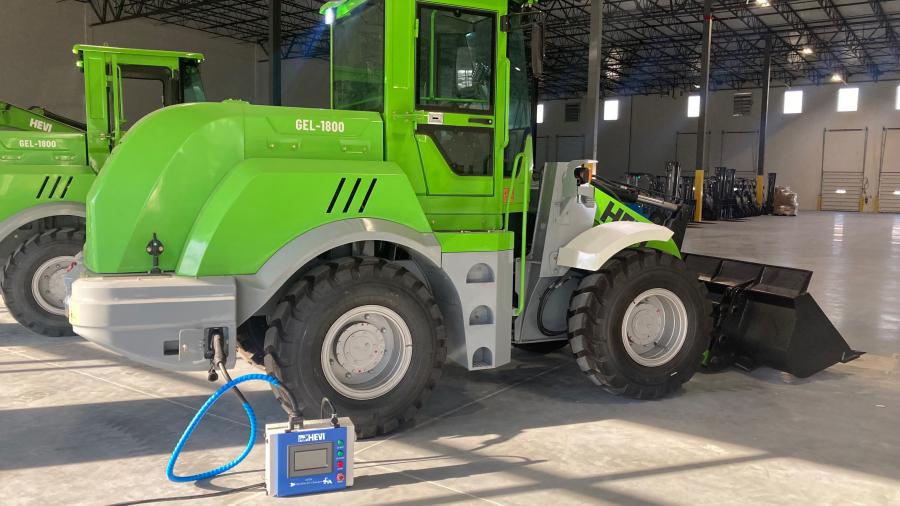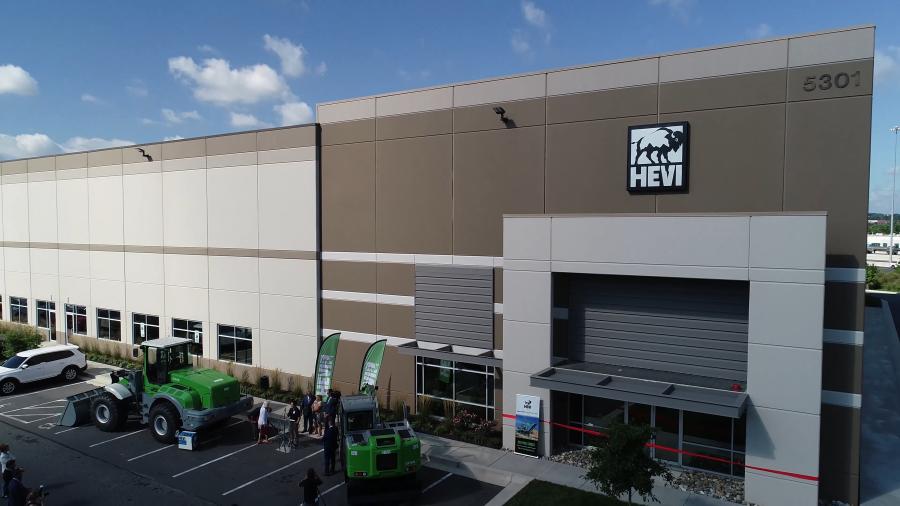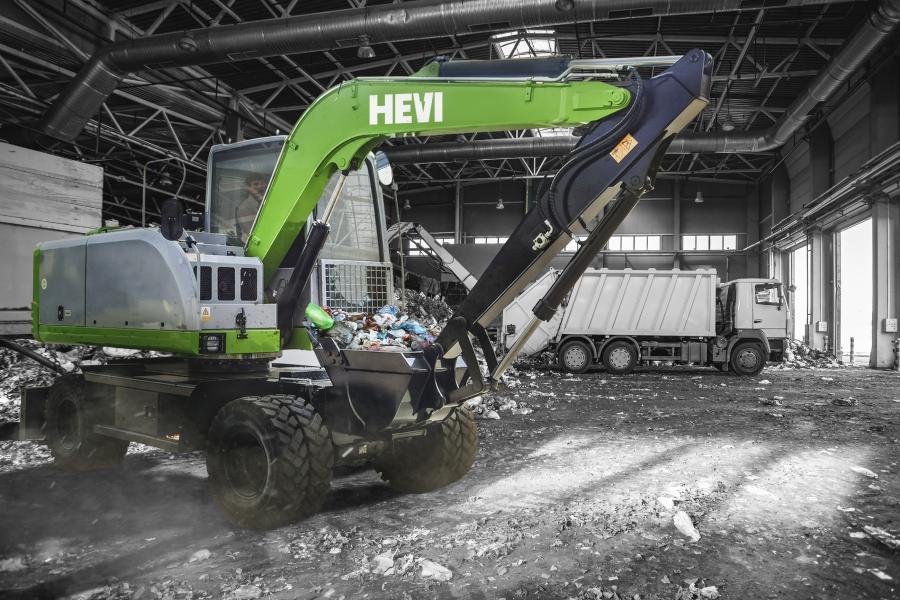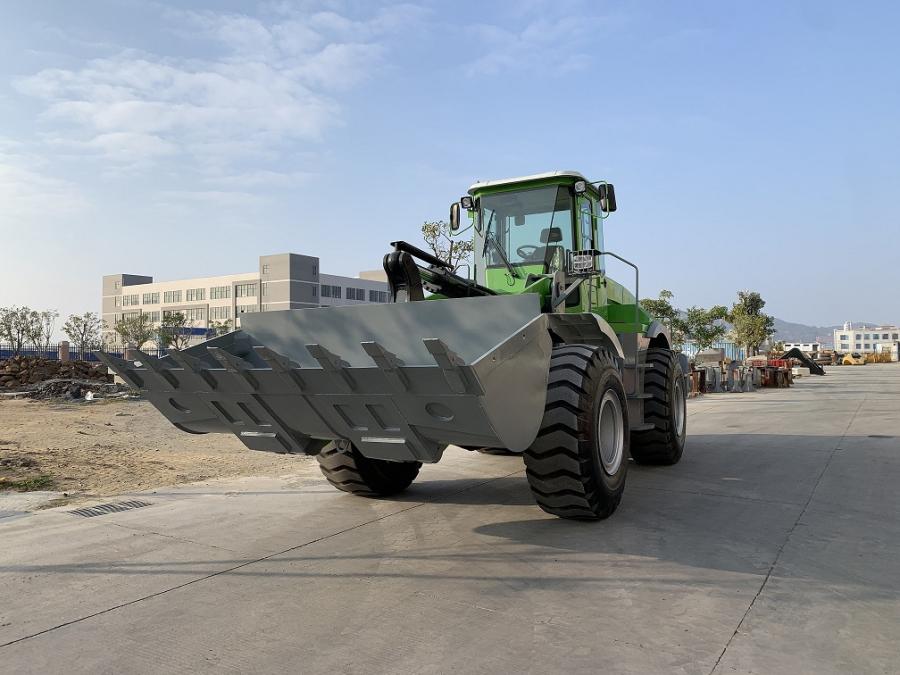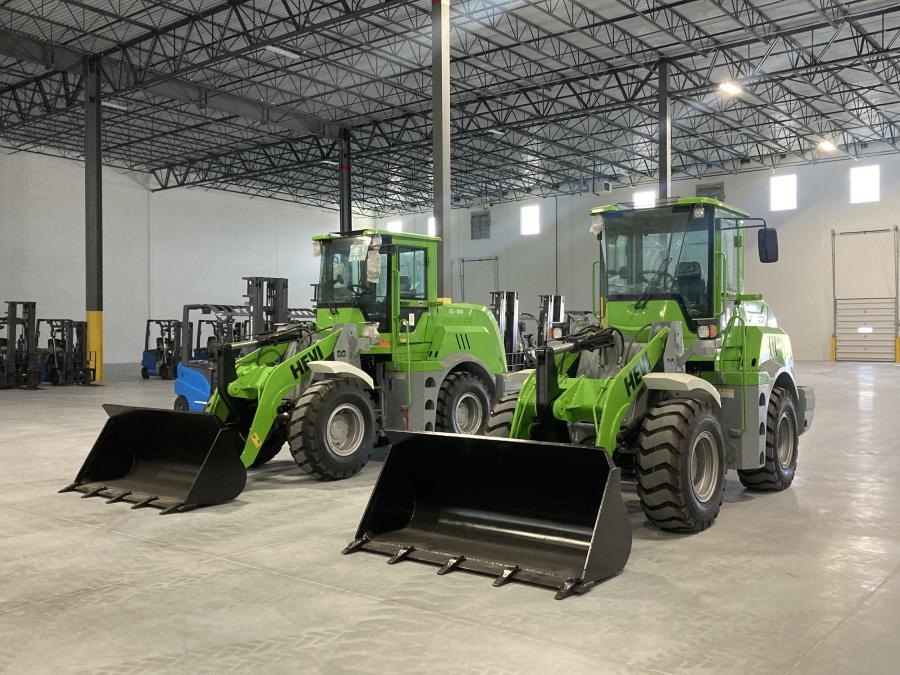HEVI Corp.’s GEL-1800 model plugged into one of the company’s chargers.
(HEVI. Corp. photo)
The development of a new manufacturing line of heavy equipment products has come on the scene within the last few years with the goal of leading the charge of American companies that offer fully electrified construction equipment.
Founded at the end of 2019, HEVI Corp. was developed with the mindset of offering alternative and clean technologies to the heavy machines marketplace, as opposed to traditional diesel-powered equipment, according to Raymond Wang, HEVI's founder and CEO.
Though electric vehicles (EVs) are slowly gaining support across the planet, HEVI and its engineers have taken note that construction, waste management, and agriculture are lacking in sustainable, emissions-free equipment options. As a result, HEVI is aiming toward complete industrial electrification by employing innovative manufacturing capabilities and technology to deliver precision and power at scale.
After setting up its headquarters in East Windsor, N.J., HEVI turned its attention to building its first U.S. assembly plant, a 60,000-sq.-ft. facility that is now preparing to turn out its first line of electric loaders, excavators, and parts in Baltimore, Md. later this spring.
"HEVI is my baby and I wanted to take my team's expertise and contribute toward the overall social benefits of supplying clean and alternative technologies," Wang explained. "My mission with HEVI is to expand our business to become an OEM ourselves because I do not see another solid player coming into the market for the next five to seven years."
Although production on the first HEVI machines was done overseas, due chiefly to the global pandemic, the company was able to ship to the American market to get its EV equipment introduced here and into the hands of consumers as quickly as possible. That way, people could start using them and forming their own opinions about how well they work.
HEVI officials decided on creating a business that pursues a direct sales model, meaning the company will not be selling its equipment through a traditional dealership network.
Despite the planned rollout of electric battery charged equipment from Baltimore in April and May, Wang added, many of HEVI's products are already commercially available. He noted the maker has about four dozen units that have attracted so much interest that HEVI decided to simply allot its entire inventory to demonstration and pilot models.
"Folks are signing demo agreements to get them onto their work sites," Wang said.
Wheeled Machines Attracting Attention
HEVI's first product line included two all-electric wheeled loaders, with weights ranging from 12,000-40,000 lbs. In addition, it has manufactured a wheeled excavator with an operating weight of 18,739 lbs.
The model GEX-8000 wheeled excavator has attracted attention from road and bridge contractors, Wang noted, along with many requests for the GEL-5000 loader.
"The reason we went with the wheeled version first is because our products are best suited for on-site applications, such as a recycling yard or a salt silo property – anywhere there is access to electrical power," he said. "Those sites typically are already going to have packed ground or asphalt, and the wheel is a good application for them.
"A lot of the interest we receive is from contractors working in urban construction areas, like Philadelphia and New York, because they do not want to place steel plates down to keep treads from destroying asphalt and pavement," he continued. "Even though wheeled excavators are an advantage, we still get a lot of requests for the rubber-tracked versions."
The excavator and loaders that HEVI has produced are busily working at many different areas in the mid-Atlantic region, Wang said, through what he calls a "very aggressive demo and pilot phase" where the manufacturer has deployed its equipment to various companies ranging in size from small firms to huge corporations sporting construction equipment fleets of 1,000-plus machines.
HEVIs Powered By Top Maker of Lithium Batteries
Each of HEVI's initial models is powered by lithium-ion batteries made by CATL, the world's leader in lithium battery production.
"Our equipment can get nine hours of use out of a single charge, and to do that, even for our smallest front-end loader, it utilizes a battery that weighs over a ton and has a capacity of up to 141-kilowatt-hours at 660 volts," explained Wang. "It is massive, but that is what you would need to get a full day's shift from them."
HEVI's founder added that the battery lifecycles on his company's products last 10-12 years – with a five-year warranty -- because their non-stationary direct current (DC) chargers do so slowly and progressively. That is unlike the DC Fast Charging (DCFC) chargers used by other EV equipment makers that charge at an ultra-fast rate.
But, he said, "If that is done repeatedly, it will bring down the life of the battery."
So, rather than relying on a DCFC-powered charger, the company spent a year developing and launching its own non-stationary chargers. Now, the DCH-220-10 charger comes standard on all HEVI equipment.
"If a site has 220-volt three-phased power, or 480-volt three-phased power, a business that owns HEVI equipment can just plug in its new portable charger to a standard socket and connect our machine just as you would with a laptop," he said. "Our 480-volt DC charger will take about four to six hours to charge our machines from dead, so that you could use it for a full shift, let it charge overnight, and have it ready to go again the next day."
In addition, HEVI's machines are compatible with charging stations made by popular makers like Siemens and Blink Charging.
HEVI Plans to Quickly Respond to Customer Needs
To help support the new electric heavy equipment manufacturer's goals, Wang emphasized that HEVI's entire infrastructure needed to be close to the markets where it sells its products. "
"We specifically chose Baltimore for our first manufacturing site that will also serve as a distribution hub for our products," he added. "We are right next to the port, and we have access to major roads, railways, and air transport within minutes.
"There is a large and skilled labor force there as well, which will allow us to expand the site very quickly," Wang said. "In addition, after the Maryland plant is fully operational, we anticipate opening another facility in the state, along with more in New Jersey, New York, and Pennsylvania. Each of them will become assembly facilities and distribution hubs for our parts as well."
Beyond that, he noted HEVI has plans to continue its expansion efforts into the South Atlantic states.
"Right now, though, we are entirely focused on the Mid-Atlantic region of the U.S. for our sales because if any of our clients have an issue with their equipment, we want to make sure that we can get them a spare part that same day – or no later than one day," he explained. "We do not want to hold up their business just because of a part."
Additionally, HEVI is building an authorized service provider network through facilities like truck repair centers in the region that have the equipment to support heavy products.
If a client needs a repair at a job site, Wang said, HEVI can send a service technician out to fix the problem.
"A few shops have signed up already, and in the Mid-Atlantic region, I have spoken to people at many truck repair centers that want to sign up right away," he added.
Change Can Lead to Economic Savings
Among the challenges he and his colleagues face are educating contractors, equipment operators, and farmers – many of whom are slow to accept change – on the advantages of EV technology over traditional diesel equipment.
"We understand that we are at the forefront in converting people to a new technology. They have used diesel their entire careers, and their fathers and grandfathers also went with diesel. We want to make it easy for them to adopt electrified equipment," Wang explained.
"First off, we pegged our prices for the equipment to comparable diesel machines," he continued. "For example, with our smaller GEL-1800, a 12,000-lb. front loader, the comparable diesel version would cost about $140,000, while our model costs about $135,000, which includes the battery, base charger, and a 1.25-cu.-yd. bucket, so there is no sticker shock with it. When you factor in the power and fuel costs, and the fact that our machine, at corporate or industrial electricity rates, will only use about $2-$4 of electricity per hour, you are getting substantial savings."
In comparison to the 4-6 gallons per hour of diesel fuel used by similar loaders, Wang estimates that the GEL-1800 will save about $25,000 per year just on fuel costs alone, as well as its 40 percent maintenance savings.
By illustrating how EV technology can improve their bottom line without hindering their productivity, HEVI has been able to make inroads with many heavy equipment operating firms.
At a recent New Jersey agricultural trade show, where Wang said he was expecting to engage with equipment owners averse to change, the HEVI contingent instead turned the heads of many attendees toward their products by revealing the operational and environmental benefits of HEVI machines.
"At that point, many of them were open to the true benefits that we were trying to achieve, which includes zero carbon emissions, and they wanted to apply them to their businesses," he explained. "We were anticipating a very resistant audience concerning the technology, but that has not come to fruition. We are proud to see that our strategy has worked."
Telematics Control Evolving at HEVI
Each one of HEVI's planned product lines will be equipped with an LED monitor and utilize smart diagnostics software that gives a complete breakdown of all the equipment's measurables, from the battery life to the machine's state of health.
"In many EV products, from a maintenance standpoint, typically you must hook up a laptop to get the error codes, but our system displays the codes on the machine's monitor," Wang said. "If say, a code 302, indicating a hydraulic problem, flashes on the screen, the client can relay it to one of our service providers. The technician will know what the problem is and what tools and parts to bring on site, making the process much more efficient."
In addition, HEVI has partnered with Cyngn, a California-based company, to deploy its GPS asset-tracking system into every one of HEVI's equipment by default, meaning it comes standard at no extra cost and is loaded with three years of telematics.
"Our front-end loaders and wheeled excavator feature the basic operator-assist functions like standardized loader cruise control and auto balance," he continued. "When we do our demos and pilots, though, veteran diesel operators get into our machines, and are comfortable running them right away."
According to Wang, "the key to the adoption of electric heavy equipment is it must make sense on paper first. Then companies can consider the added benefit of our machines saving more than 100 tons of CO2 per year, their noise reduction, and all the other diverse benefits that come from running electric machines."
To learn more about HEVI's revolutionary electric equipment and check out the available models, visit www.gethevi.com. CEG
Eric Olson
A writer and contributing editor for CEG since 2008, Eric Olson has worked in the business for more than 40 years.
Olson grew up in the small town of Lenoir, NC in the foothills of the Blue Ridge Mountains, where he began covering sports for the local newspaper at age 18. He continued to do that for several other dailies in the area while in college at Appalachian State University. Following his graduation, he moved on to gain experience at two other publications before becoming a real estate and special features writer and editor at the Winston-Salem Journal for 10 years. Since 1999 he has worked as a corporate media liaison and freelance writer, in addition to his time at CEG.
He and his wife, Tara, have been married for 33 years and are the parents of two grown and successful daughters. His hobbies include collecting history books, watching his beloved Green Bay Packers and caring for his three dogs and one cat.
Read more from Eric Olson here.
Today's top stories



